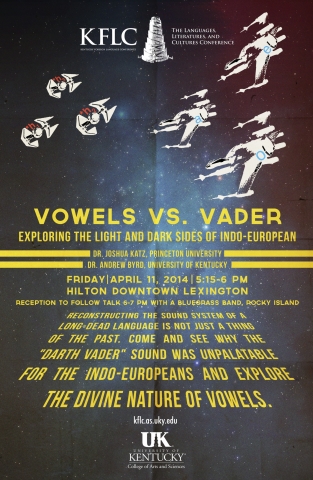Dissertation Defense of Sarah Finley
You are invited to the dissertation defense of Sarah Finley, entitled "Acoustic Epistemologies and Aurality in Sor Juana Inés de la Cruz."
12:30-2:30PM on Thursday, April 17, 2014 in 1145 Patterson Office Tower
You are invited to the dissertation defense of Sarah Finley, entitled "Acoustic Epistemologies and Aurality in Sor Juana Inés de la Cruz."
12:30-2:30PM on Thursday, April 17, 2014 in 1145 Patterson Office Tower
You are invited to the dissertation defense of Whitaker Jordan on Wednesday, April 23rd at 2:00PM in 1145 Patterson Office Tower.
Reconstructing the sound system of a long-dead language is not just a thing of the past. Come and see why the "Darth Vader" sound was unpalatable for the Indo-Europeans and explore the divine nature of vowels

Surveys now show that a significant fraction (approximately one quarter) of early-type galaxies have molecular gas, detected via CO. The molecular gas in early-types is found to be in very central distributions, where the effects of shear, hydrostatic pressure and possible AGN influence will be maximal. But little is yet known about the state of molecular gas in these galaxies. I will present the results of a survey of 18 molecular-gas rich early-type galaxies from the Atlas3d sample in 12CO, 13CO, HCN and HCO+ from the IRAM 30m telescope. This study reveals a wide range of average optical depths for the molecular gas, but a fairly constant dense gas fraction. We also currently know little about the origin of the molecular gas in these systems, but the molecular gas kinematics indicate that accretion from external sources plays an important role. Additionally, I will discuss whether the molecular gas in early-type galaxies may be less efficient at forming stars, despite the universal molecular gas-SFR relation observed for other galaxy types.
---------
Refreshments will be served at this event.
Title: TBA
Abstract: TBA
Title: Power operations and the Kunneth spectral sequence
Abstract: Power operations have been constructed and successfully utilized in a variety of spectral sequences. Such constructions arise from highly structured ring spectra. In this talk, we show that the Kunneth Spectral Sequence enjoys some nice multiplicative properties and use old computations of Steinberger's with our current work to compute operations in the homotopy of some relative smash products. We will end with an application of these computations to give a non-existence result for $E_{\infty}$ complex orientations of certain ring spectra.
Title: Fixed Points in Partially Ordered Sets
Abstract: In this talk we will look at what conditions we need to impose on posets to ensure automorphisms of the poset have fixed points. We will prove, and use, a discrete version of the famous Hopf-Lefshetz fixed point theorem from topology. Examples will be emphasized.
Title: On Certain Convex Sets of Measures and on Phases of Reacting Mixtures.
Abstract: In the 1970's, Walter Noll developed a modern version of the elements of Gibbsian thermostatics for describing the equilibrium of mixtures. In this talk, we will see how we can use mathematical tools to explain why Gibbs said "it does not seem probable that r can ever exceed n+2" where n stands for number of components in a mixture and r stands for the number of coexistent phases. We will also exploit some other properties of a mixture when a it is in equilibrium.